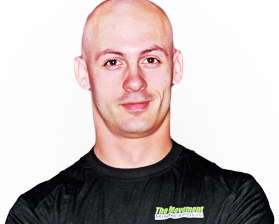
If you come train with me either at my gym, The Movement Minneapolis, or via online coaching you’ll have to adopt a new paradigm for their training – but once you do you’ll find that it permeates the rest of your life.
The classic paradigm is essentially one of prescription. Your program says to do this so you do this. Maybe you make some small adjustments. If you’re working with a good coach they definitely make some tweaks. But generally speaking you’re going to do what is planned.
I teach a different approach. I only want you to do things that are good for you to do – right now. If it’s going to make you better, you do it. If it’s going to make you worse, you don’t do it.
So how can you know whether it’s good for you or not? Surely deadlifts are always good for you, right? No, not so fast.
The state of your body, mind, and all of the pieces and systems that are parts of the whole are in constant flux. Your tissues are constantly adapting, remodeling, and changing and your brain and nervous system too is always in flux.
So what would be a bad day to deadlift? Well a day in which you’ve created a lot of tissue damage with another workout probably wouldn’t be ideal to add more heavy deadlifts to your recovery load. Or, on the “softer” side of tissues, a day that you’re perhaps physically fresh but mentally completely exhausted from strenuous mental exertion might not be the best day to add more nervous system load.
But how can you know?
When it comes to movement, this is where biofeedback is extremely useful. You can simply test how you respond to the actual movement. If you respond positively then great it’s good for you to do right now, if you respond negatively it’s probably best to push it out until the next time. The question is, “Is this good for me to do right now?”
But what about things that aren’t so clearly movement based. That perhaps you can’t test so easily.
This is where the big picture of asking “is this good for me to do right now” comes into play.
If you’ve ever worked on learning a skill you know that there are days when you feel like everything is clicking, and days where no matter how hard you try things just aren’t coming together. And yet, you can come back to something you were really struggling with and a day or two later it just clicks.
What I try to do is make the most of the times when things are clicking, and cut short the sessions where everything feels off. Even if it doesn’t feel great to give up or stop doing something you love to do when you’re feeling frustrated. Obviously there is a wide gray area between putting in the work and the inherent struggle of learning and when things aren’t going well, but as I’ve written before, the better you get at predicting the better your results will be.
What you’ll find is that if you stop the poor practice prematurely, your brain will integrate when you’re away from the practice itself and when you come back you’re better than before seemingly without having done anything.
We’re going to talk more about speeding up and supporting that process of integration in a follow-up article, but the main point to keep in mind is maximizing the good practice, and minimizing the bad.
As you probably know, one of my passions besides lifting is skydiving. Since the advent of indoor vertical wind tunnels skydivers can turn money into noise and skill faster than ever before. But flying in the tunnel can be as frustrating as it is mentally exhausting. Because a single 15-minute session in the tunnel can easily equate to a month of skydiving you can see the skill improvement measured in minutes in a way that really is unparalleled by anything I can think of. By the same token, I know that if something isn’t clicking it’s best for me to either move on to a different skill or to stop completely for the day. Usually when I come back in a week whatever I was struggling with comes to me almost instantly.
Of course, this paradigm doesn’t just apply to skill acquisition, motor learning, or training.
The two sectors of peoples lives most often affected by this mindset shift are their job and their relationships.
“Is this good for me, right now?”
If you are going to work every day and answering no, this is not good for me, I would wager your days at that job are numbered.
If almost every moment or engagement in a relationship results in a “not good” rating, I’d wager that relationship is coming to an end.
And why shouldn’t it? Time is your only non-renewable resource. It’s almost indisputably your most valuable resource. If what you’re doing isn’t good for you, it means you’re wasting time that could be spent on something that is good for you to do.


Leave a Reply